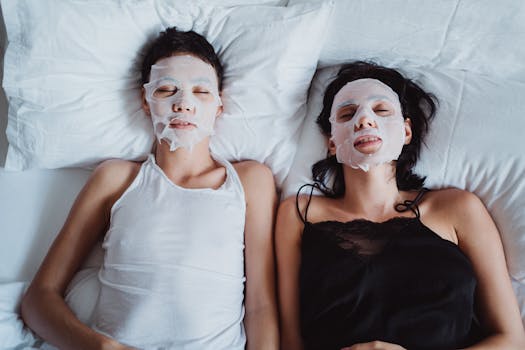
Creating a Balanced Sleep Routine for Better Rest
Focus Keyword: Creating a Balanced Sleep Routine
Creating a balanced sleep routine is essential for better rest and overall well-being. A good sleep routine can help improve the quality of your sleep, increase energy levels, and enhance your mental and physical health. In this article, we will discuss the importance of a balanced sleep routine and provide tips on how to create one.
Why is a Balanced Sleep Routine Important?
A balanced sleep routine is important because it helps regulate your body’s internal clock and ensures that you get the right amount of sleep each night. When you have a consistent sleep routine, your body gets into a rhythm, and you wake up feeling refreshed and rested. A balanced sleep routine can also help improve your mood, reduce stress and anxiety, and increase your productivity.
How to Create a Balanced Sleep Routine
Creating a balanced sleep routine involves establishing a consistent sleep schedule, creating a relaxing bedtime routine, and avoiding stimulating activities before bedtime. Here are some tips to help you create a balanced sleep routine:
- Set a consistent sleep schedule: Go to bed and wake up at the same time every day, including weekends.
- Create a relaxing bedtime routine: Engage in activities that help you relax, such as reading a book, taking a warm bath, or practicing yoga or meditation.
- Avoid stimulating activities before bedtime: Avoid watching TV, using electronic devices, or engaging in intense conversations before bedtime.
- Make your sleep environment comfortable: Make sure your bedroom is dark, quiet, and at a comfortable temperature.
- Avoid caffeine and nicotine: Both caffeine and nicotine can disrupt your sleep patterns, so it’s best to avoid them altogether.
Tips for Improving Your Sleep Routine
In addition to creating a balanced sleep routine, there are several other tips that can help improve your sleep quality. Here are a few:
- Avoid naps: While naps can be helpful for some people, they can disrupt your sleep patterns if you’re not careful.
- Get regular exercise: Regular exercise can help improve your sleep quality, but avoid exercising too close to bedtime.
- Try relaxation techniques: Techniques such as deep breathing, progressive muscle relaxation, and mindfulness meditation can help you relax and prepare for sleep.
- Consider keeping a sleep diary: Keeping a sleep diary can help you track your sleep patterns and identify areas for improvement.
Conclusion
Creating a balanced sleep routine is essential for better rest and overall well-being. By establishing a consistent sleep schedule, creating a relaxing bedtime routine, and avoiding stimulating activities before bedtime, you can improve the quality of your sleep and wake up feeling refreshed and rested. Remember to also try relaxation techniques, avoid naps, and consider keeping a sleep diary to help you track your progress.
Additional Tips for Creating a Balanced Sleep Routine
In addition to the tips mentioned above, here are a few more tips that can help you create a balanced sleep routine:
- Make sure your bedroom is dark: Use blackout curtains or shades to block out any light that may be entering your room.
- Invest in a comfortable mattress: A comfortable mattress can make a big difference in the quality of your sleep.
- Avoid eating heavy meals close to bedtime: Eating a heavy meal too close to bedtime can disrupt your sleep patterns.
- Try to avoid screens before bedtime: The blue light emitted by screens can interfere with your sleep patterns.
Common Sleep Disorders and How to Overcome Them
Sleep disorders are common and can disrupt your sleep patterns, making it difficult to get the rest you need. Here are some common sleep disorders and how to overcome them:
- Insomnia: Insomnia is a condition where you have difficulty falling or staying asleep. To overcome insomnia, try establishing a consistent sleep schedule, avoiding stimulating activities before bedtime, and creating a relaxing bedtime routine.
- Sleep apnea: Sleep apnea is a condition where you stop breathing for short periods of time while you’re asleep. To overcome sleep apnea, try losing weight, avoiding alcohol and sedatives, and using a continuous positive airway pressure (CPAP) machine.
- Restless leg syndrome: Restless leg syndrome is a condition where you experience uncomfortable sensations in your legs, such as itching or tingling. To overcome restless leg syndrome, try stretching, exercising, and avoiding caffeine and nicotine.
The Importance of Sleep for Overall Health and Well-being
Sleep is essential for overall health and well-being. During sleep, your body repairs and regenerates damaged cells, builds bone and muscle, and strengthens your immune system. Sleep also helps to improve your mood, reduce stress and anxiety, and increase your productivity. Here are some ways that sleep can impact your overall health and well-being:
- Cardiovascular health: Sleep can help to lower your blood pressure, reduce your risk of heart disease, and improve your overall cardiovascular health.
- Weight management: Sleep can help to regulate your appetite, reduce your cravings for unhealthy foods, and improve your overall weight management.
- Mental health: Sleep can help to reduce your risk of depression, anxiety, and other mental health disorders.





